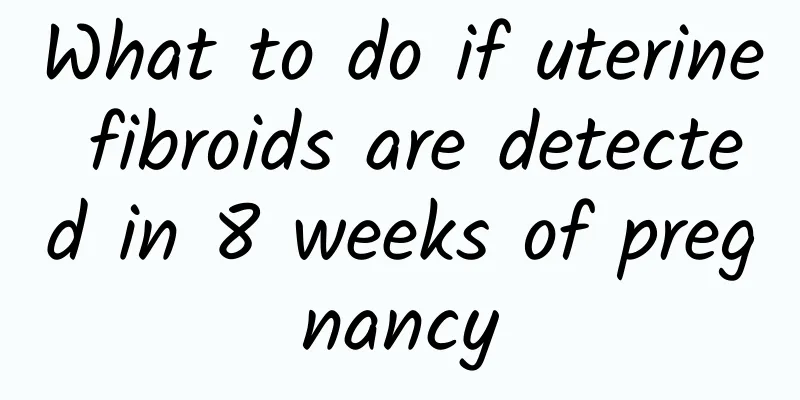What are the symptoms of congenital miscarriage?

|
Congenital miscarriage refers to miscarriage during pregnancy due to congenital factors such as genetic or abnormal development of the embryo itself. Its symptoms include abnormal vaginal bleeding, abdominal cramps or severe pain, and loss of pregnancy reaction. If similar symptoms are found, you should seek medical attention as soon as possible, and make a clear diagnosis through B-ultrasound, blood tests, etc., and choose treatment or care methods according to the cause. 1. The main cause of congenital miscarriage The causes of congenital miscarriage mainly come from problems with the embryo itself and congenital abnormalities of the mother. 1. Genetic factors: Embryonic chromosomal abnormalities are the most common cause of congenital miscarriage, accounting for more than 50%. Abnormal chromosome numbers such as trisomy syndrome or structural abnormalities such as balanced translocation may cause the embryo to be unable to develop normally. 2. Maternal physiological abnormalities: Congenital developmental abnormalities of the maternal uterus, such as uterine septum and double uterus, can affect embryo implantation and development. Cervical incompetence may cause miscarriage in the early or mid-pregnancy. 3. Endocrine problems: In a few cases, miscarriage is caused by congenital hormonal abnormalities of the mother, such as luteal insufficiency. 2. Common symptoms of congenital miscarriage 1. Abnormal vaginal bleeding: This is the most typical manifestation, which may appear as brown discharge or bright red bleeding with varying flow rates. 2 Abdominal cramps or pain: Miscarriage is often accompanied by lower abdominal pain caused by uterine contractions, ranging from dull pain to severe pain. 3. Disappearance of pregnancy reactions: A sudden reduction in pregnancy reactions such as nausea and vomiting in early pregnancy may indicate a decrease in progesterone levels. 4Other symptoms: Some pregnant women may experience increased fatigue, low fever or weakness. 3. Diagnosis and treatment methods If you find the above symptoms, you should seek medical attention in time and use professional diagnosis methods to determine the cause: 1. Imaging examination: Ultrasound examination is an important method to confirm miscarriage and its causes, and can directly observe the development of the embryo. 2 Blood test: Check whether the pregnancy status is stable by measuring the HCG and progesterone levels in the blood. 3. Genetic examination: If there are multiple miscarriages or the tissue after miscarriage can be sent for embryo chromosome analysis to find out whether it is abnormal. Treatment and care include the following: 1. Drug treatment: If signs of miscarriage exist but the fetus is still alive, progesterone drugs can be used to support pregnancy. 2Surgical treatment: If the embryo stops developing and is not expelled naturally, uterine curettage can be chosen to completely remove the embryonic tissue. 3. Psychological and nutritional care: After miscarriage, attention should be paid to maternal psychological counseling and balanced dietary supplements to avoid pregnancy again in the short term. Congenital miscarriage is mostly related to unavoidable congenital factors. The key is to seek medical attention in time after the symptoms are discovered, identify the cause and take appropriate treatment measures. In future pregnancies, women with a history of miscarriage are advised to conduct pre-pregnancy and pregnancy management under the guidance of a doctor to minimize the risk of another miscarriage. |
<<: What to do if the enlarged uterus compresses the bladder due to adenomyosis
>>: Can I get pregnant with uterine fibroids?
Recommend
How to eat on the two-day diet to lose weight?
By Michelle Harvey and Tony Howe The purpose of t...
How to prevent cervical warts
I believe everyone has heard a lot about cervical...
What should I pay attention to after treating cervical erosion?
What should I pay attention to after treating cer...
People with irregular menstruation still have oily skin
People with irregular menstruation also have oily...
Be alert to symptoms of uterine fibroids
Uterine fibroids are very harmful to women, and t...
What are the symptoms of mild vaginitis
What are the symptoms of mild vaginitis? First: T...
How long does it take to expel the abortion pill? Usually 2 to 6 hours
Generally speaking, after taking the abortion pil...
How long should I rest after a medical abortion?
How long should I rest after a medical abortion? ...
Abnormal leucorrhea does not affect pregnancy
Abnormal vaginal discharge may affect pregnancy, ...
Specific causes of irregular menstruation in women
Irregular menstruation is something women often e...
How much does it cost to cure cervical warts?
In life, many patients with cervical condylomata ...
Adnexitis may cause premature aging in women
Adnexitis can be divided into acute adnexitis and...
Can I eat hawthorn after a miscarriage? Yes, I can eat a little bit.
Women who have had a miscarriage generally need t...
How to treat chronic cervicitis? Chinese medicine can treat chronic cervicitis
Chronic cervicitis is a relatively common gynecol...
What should women do if their menstrual flow is heavy?
What should women do if they have heavy menstrual...









